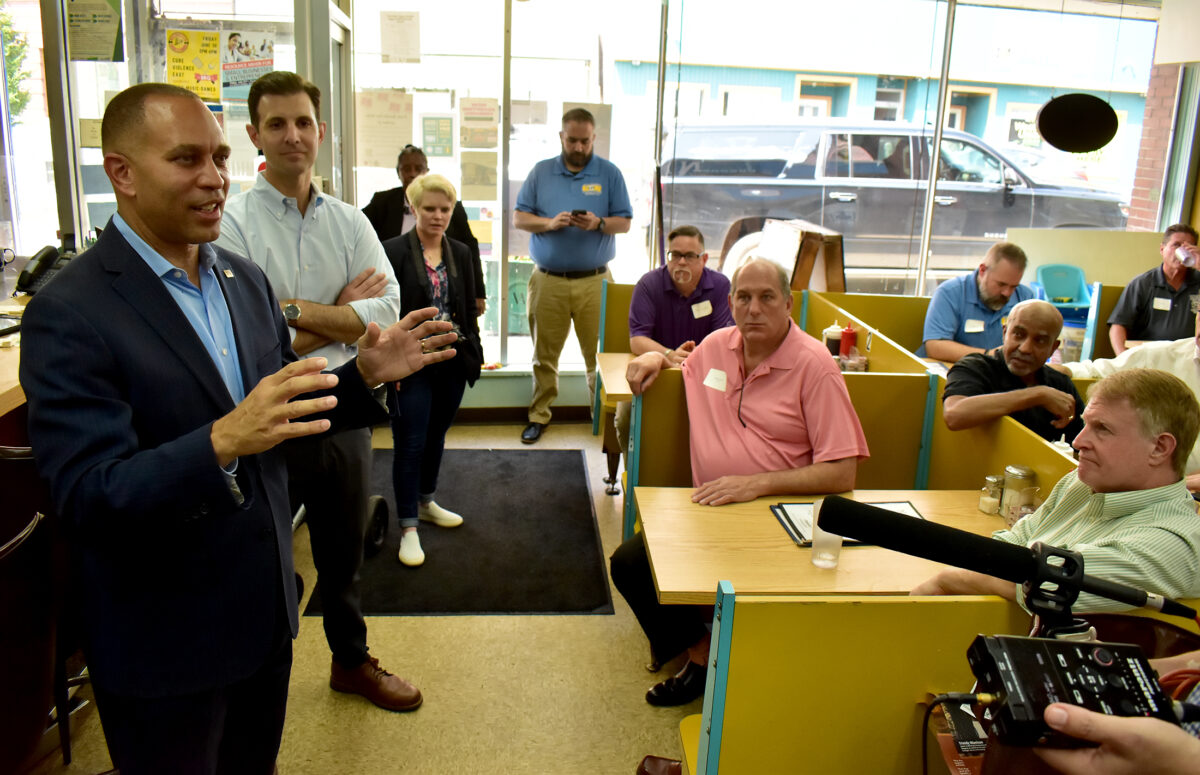It was fitting that Hakeem Jeffries, the most powerful Democrat in Congress and perhaps future speaker of the House, told a family story dating back to the 1960s while standing in a tiny Wilkinsburg diner that looks much like it did when it was first opened 50 years ago.
Jeffries is a congressman representing New York’s 8th District. His Democratic colleagues voted him House Democratic leader in November, making him the first African American to lead a party caucus.
The origins of his story begin with his parents. They were newlyweds, he said, when they faced a consequential decision in 1967.
Both his mother and father were employed as social workers, and the union representing them had called a strike. Would the couple join their union colleagues on the picket line and face an uncertain financial future while fighting for better benefits and working conditions? Or would they “lean into short-term gain” and cross the picket line?
The question hung briefly in the air, but there was no real drama to the story. Everyone knew the answer. That, however, didn’t make the story any less satisfying to Jeffries’ audience of nearly two dozen labor leaders and elected officials, who sat in diner booths that included menus and neatly placed bottles of ketchup and syrup. (The diner, Nancy’s Revival, is famous for its crepe-style pancakes and chili.)
When Jeffries discovered this piece of family history years later, he was “proud to learn that, without hesitation, both of my parents decided to go out on strike and stand with their union brothers and sisters.”
In fact, unions have been central to his family’s successes, he said.
“My younger brother was born with a serious heart condition in the 1970s,” Jeffries said. “It was a tough moment, but it was union-negotiated health care that helped our family make it through a very difficult time. And then in the 1980s, when my parents bought their first home — the home they still live in to this very day, the home my younger brother and I were raised in, in a working-class neighborhood in Crown Heights in central Brooklyn — they were able to pay the mortgage and eventually clear the mortgage because of their union-negotiated salaries.”
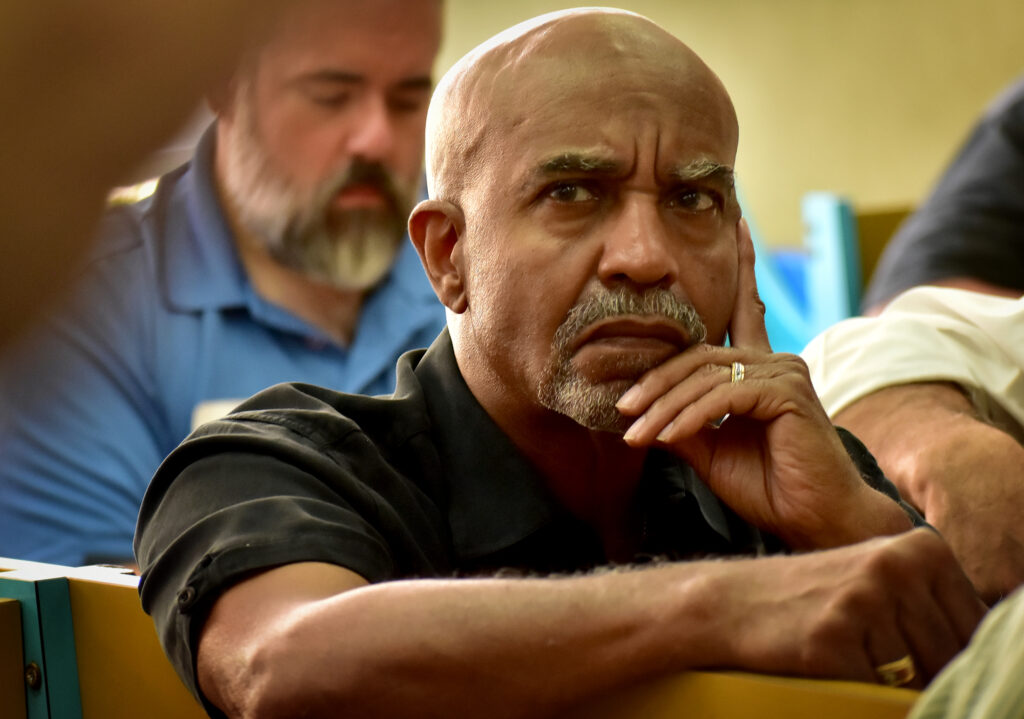
Jeffries and his host, U.S. Rep. Chris Deluzio, D-Aspinwall, of Pennsylvania’s 17th District, had scheduled the Sunday afternoon event to express their support for organized labor and to tout bills benefiting union members and America’s middle class — bills that Democrats had steered through Congress and were then signed into law by President Joe Biden.
They discussed the bipartisan infrastructure bill (Biden came to the city to discuss this law the day the Fern Hollow Bridge collapsed in late January 2022); the CHIPS and Science Act that directs $280 billion to boost domestic research and manufacturing of semiconductors in the U.S.; and the Inflation Reduction Act, which, among other things, provides investments in clean energy production.
Jeffries said it’s important for Democrats to discuss these legislative successes so the party can “say to the American people, ‘Trust us, we say what we mean, and we mean what we say.’ When we say we want to make life better for everyday Americans, we mean it.”
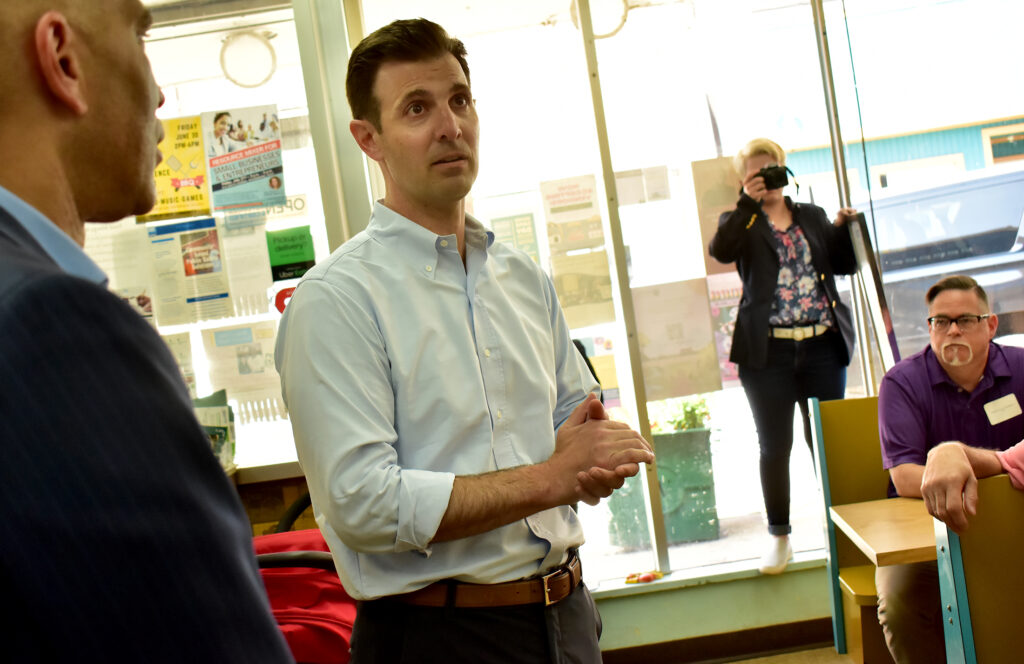
Deluzio has focused on issues of concern to organized labor since taking office early this year. (In his first speech on the House floor, Deluzio voiced his support for striking workers at the Pittsburgh Post-Gazette.) He mentioned the importance of a pending bill called the Protecting the Right to Organize Act, or PRO Act.
The bill would reform labor laws and give workers additional power to organize and collectively bargain. In addition, Deluzio said, the PRO Act could “fundamentally change the playing field back to one that is fair for workers” who are attempting to form and join unions and establish “real consequences” for employers who violate laws.
“Now the consequences when you break the rules are pretty minor, a slap on the wrist,” Deluzio said. “We’ve seen a multi-decade war on unions and workers, and it has worked. It happened because the laws are stacked against workers. We start rebuilding by passing the Pro Act.”
Jeffries agreed.
“Protecting the right to organize will be one of the central legislative items at the top of our list,” he said, “because it’s so fundamental to being able to unlock, for generations to come, the great American dream for the middle class and those who aspire to be a part of it.”
Passing labor-friendly laws in a GOP-controlled House isn’t easy. In fact, both Jeffries and Deluzio said that much of their time is spent in what they called “playing defense.”
This is necessitated, Jeffries said, because of “efforts by the extreme MAGA Republicans on the other side of the aisle to cut Social Security, cut Medicare, cut Medicaid, cut veterans benefits, cut public safety funding and cut funding for public education.”
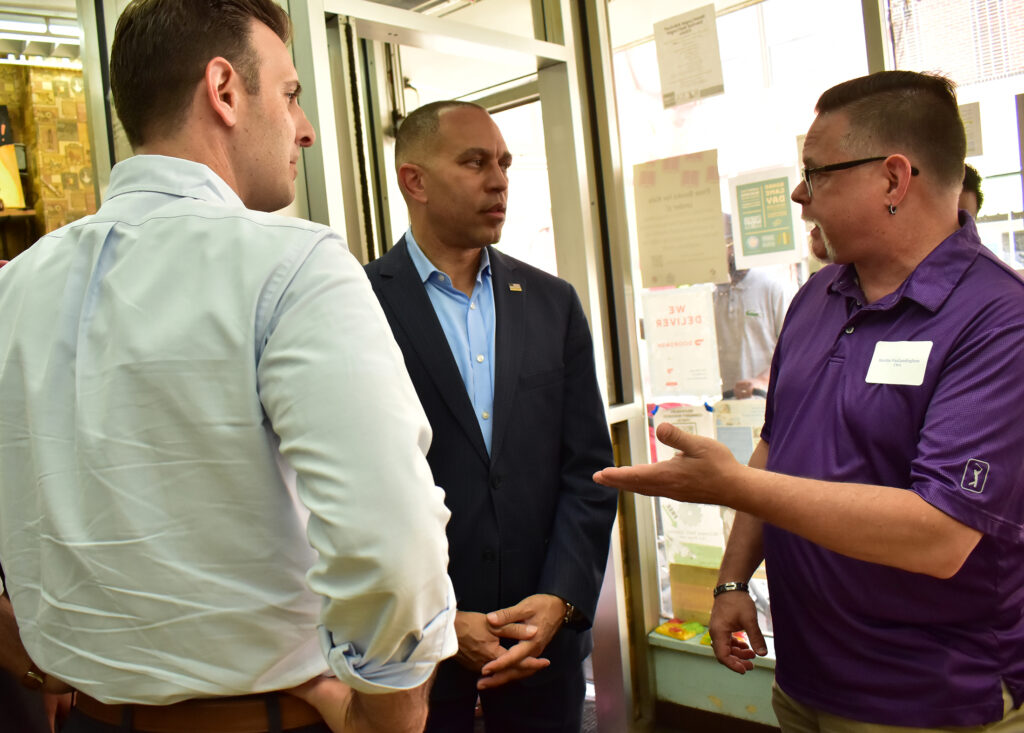
Jeffries provided a bit of a history lesson, discussing the rise of the middle class in the aftermath of World War II and its subsequent decline as the result of poorly negotiated trade deals, the outsourcing of good-paying jobs, a decline in union membership and the rise of workplace automation.
In addition, he cited a “clear effort to take the productivity gains of the American worker and distribute them unevenly to the wealthiest 1% amongst us as opposed to those responsible for those productivity gains.”
Democrats, he said, recognize the role organized labor has and continues to play in building a middle class, but the party’s efforts to support unions are under assault from a “diabolical group of people who want to take this country in a very different direction. We believe in building an economy from the middle out and the bottom up, but there are people in this country who want to continue to rig the economy from the top down. And those are the stakes.”
Jeffries said he and his colleagues have for the past two years pushed back by introducing and passing legislation that benefits workers and the middle class.
“We’re just getting started,” he said. “We’re not going to be able to reverse 40 years of decline with two years of legislative effort. It’s a strong foundation, but we’ve got to lean into it with intentionality, and that’s what we’re intending to do.”
• • •
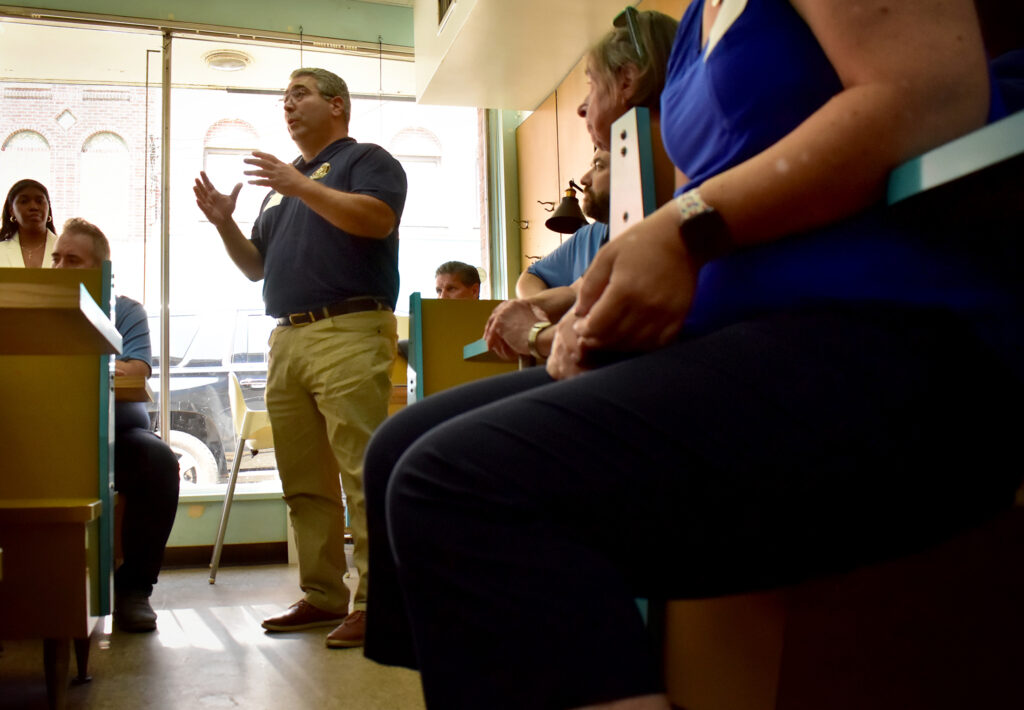
A number of union leaders got their chance to speak during Sunday’s event. Ralph Sicuro, president of the Pittsburgh Fire Fighters union, used his time to discuss the bipartisan infrastructure bill and the importance of investing in roads and bridges. He used as an example the collapse of the Fern Hollow Bridge.
“It’s an inconvenience for commuters who have to go around it,” he said, “but think about the added time for the response of our first responders. Even if it’s only two minutes — 120 seconds. It may not seem long for people that are just on a commute, but when your house is on fire, 120 seconds is a long time. If your heart isn’t beating for an additional 120 seconds because we had to travel around a bridge that collapsed, or a bridge that had weight restrictions because we weren’t able to maintain it, that’s a significant impact to human lives.”
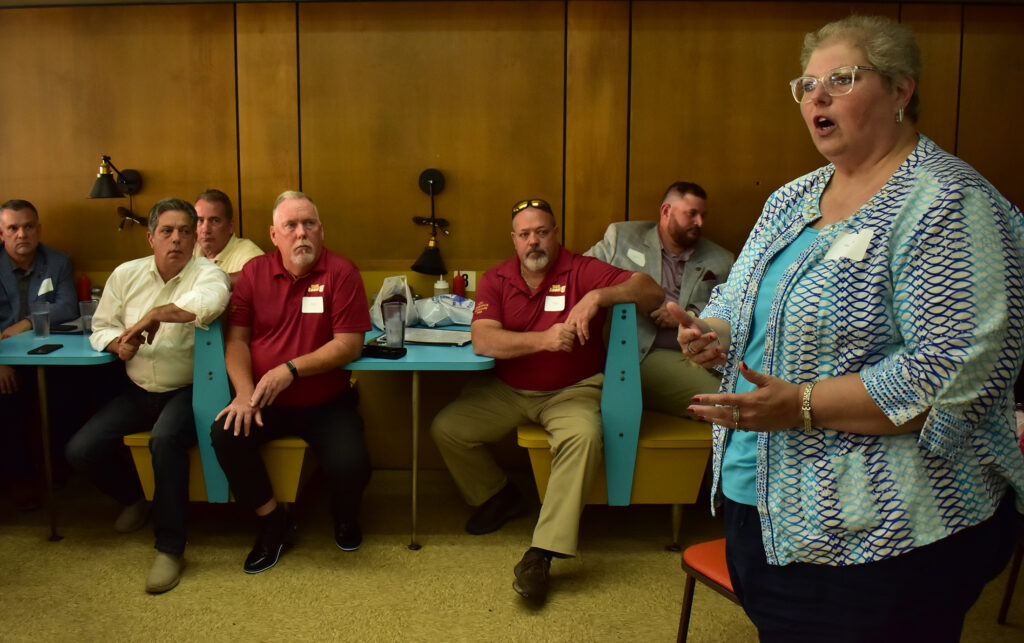
• • •
During a brief question-and-answer session with members of the media near the end of Sunday’s event, Deluzio paused during a discussion of the PRO Act to bring up another hot-button issue.
“We are fending off attacks on abortion every day in Washington from MAGA extremist Republicans that want to ban abortion,” he said. “That will be among our top priories once we take back the House.”
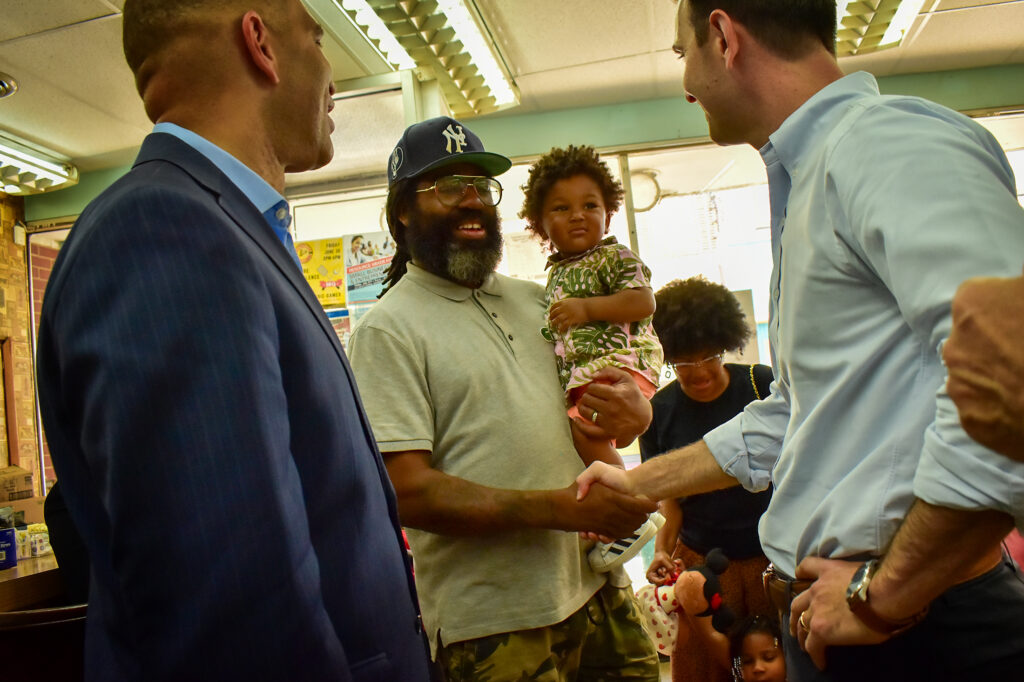
Steve is a photojournalist and writer for the Pittsburgh Post-Gazette, but he is currently on strike and working as a Union Progress co-editor. Reach him at smellon@unionprogress.com.

